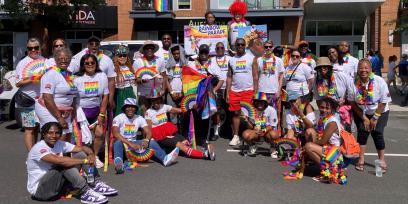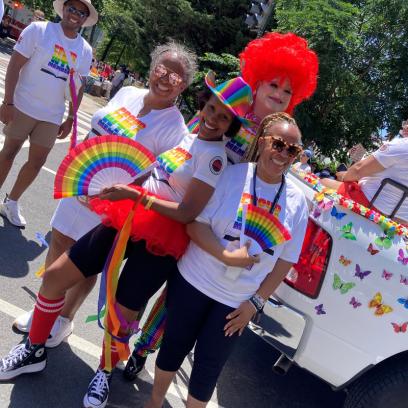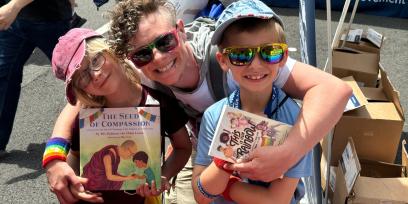The nation may be facing grim times with book bans and censorship against the LGBTQIA+ community, but on June 8 the streets of the nation’s capital were bright with color and sequins, miniature flags and snapping rainbow fans held by dancing, joyful people who turned out in droves to celebrate Pride. Among those marching in the annual parade were members of the Washington Teachers’ Union, showing up for their community.
“We want to support our city and the diversity we have in the city,” said WTU President Jacqueline Pogue Lyons. “And we want people to know this organization is here.” The union also handed out 1,000 books during the festival the following day.
Teachers are among those closest to the struggle among LGBTQIA+ young people, and AFT members across the country want them to know that they have allies in their classrooms. “Every kid should feel like they belong and they have a place that is inviting and warm and they can be themselves,” said middle school Spanish teacher Michael Donaldson, who makes sure he includes a Pride flag in his back-to-school presentations. “I want to be the person I didn’t have when I was growing up,” adds ESOL teacher Araceli Lobato. “In the end, we’re in this profession because it’s for the kids.”
While WTU gathered in D.C., executive board members of the CFT, the AFT’s California affiliate, gathered along with rank-and-file folks on the other side of the country at the Sacramento Pride parade.. In cities like Minneapolis, Chicago, Miami, Los Angeles, Seattle and Detroit, countless others are turning out to proclaim their place in a society that has a long and sometimes violent history attacking LGBTQIA+ people.
In New York City, members of New York State United Teachers and the United Federation of Teachers will march in the June 30 parade, where every year they turn out in large numbers to celebrate Pride. Their commitment matches the significance of the city’s parade, which consistently draws more than 2 million people and is considered the largest in the world. UFT and NYSUT members recognize their local history as well: Pride parades began after the Stonewall Uprising in 1969, when a police raid on the Stonewall Inn, a popular New York City gay bar, turned violent. The next year, 1970, was the first Pride parade commemorating the struggle and, ultimately, the fight for dignity and respect.
Beyond the parades, Pride events include concerts, block parties, award ceremonies, book festivals, art exhibits, walking tours, lectures, group runs, benefits and more. On June 15, the AFT’s LGBTQIA+ Task Force will meet in Fort Lauderdale, Fla., visit the Stonewall National Museum, Archives and Library in Wilton Manors to support education programs there, and march in the internationally renowned Wilton Manors Pride parade in a state that has been especially beleaguered by anti-LGBTQIA+ legislation. Last year’s event featured T-shirts proclaiming “Say Gay,” a direct retort to the “Don’t Say Gay” legislation restricting education.
A study in contrasts
The enthusiasm, joy and resistance is especially welcome during a time when LGBTQIA+ people are being attacked by state legislators across the country. Hundreds of anti-LGBTQIA+ bills have been introduced, limiting healthcare options, banning books by and about LGBTQIA+ people, censoring school curriculum, prohibiting trans kids from playing sports and banning the use of proper pronouns and choice regarding what bathroom to use.
The flood of legislation has been so bad that the Human Rights Campaign declared a state of emergency last year. Today it reports that more than 75 anti-LGBTQIA+ bills have passed into law this year, twice as many as passed last year; it continues to track more than 750 legislative actions that affect the LGBTQIA+ community, which you can see here.
Juxtaposing the exuberant Pride celebrations with the threat of erasure can be an emotional roller coaster ride. But AFT affiliates and members are climbing on board.
In addition to fighting against anti-LGBTQIA+ legislation, rallying allies and collaborating with our partners, we are fighting for protections like more inclusive nondiscrimination laws and anti-conversion therapy legislation. Activism at the state level is high from Florida to Washington.
Even in the state where Don’t Say Gay originated, there were some gains. According to Equality Florida, despite 22 extreme anti-LGBTQIA+ bills introduced—bills that would have banned Pride flags and symbols, banned abortions and expanded Don’t Say Gay policies beyond schools to workplaces—activists were able to neutralize all but one. As for laws already in place, the Florida Education Association created a guide about how to navigate them as educators, and a recent court settlement clarified some of the details, walking back the most extreme elements, such as limitations on discussing LGBTQIA+ people at all.
It’s in the contract
And it’s not just about legislation. Our contracts are seeded with protections, and have been for years, from same-sex partner benefits to anti-bullying language. Pride at Work has a guide to model contract language: You’ll find examples that ensure that the term “immediate family” includes same-sex domestic partners and that require gender-affirming healthcare. The Graduate Employees’ Organization, an AFT affiliate at the University of Michigan, won specific language around trans healthcare in its last contract, including hormone replacement therapy, reconstruction surgery, permanent hair removal, tracheal shave and more.
“The strongest protections for lesbian, gay, bisexual, transgender, and queer workers is a union contract,” Pride at Work declares on its website.
Speak up, speak out and educate
The AFT also fights for the right to free expression: Far from banning rainbow stickers and flags, for example, CFT sent out more than 20 boxes full of pins, flags and safe and welcoming stickers to hand out at worksites. CFT Pride T-shirts are top-shelf items at its online store.
Meanwhile, the AFT has made a point of including LGBTQIA-themed books among the 10 million books it has distributed through its partnership with First Book and Reading Opens the World. Titles like Be a Bridge, about diversity and inclusion, and Thanks a Lot, Universe, which features a biracial, queer teen, reassure some children that they are not alone, and expand knowledge and understanding for others.
The AFT also offers many resources for educators who want to ensure their schools are safe and welcoming for everyone. On Share My Lesson, the AFT’s free online resource, there are dozens of professional development blogs, toolkits and webinars on topics like gender bias, pronouns, myths about LGBTQIA+ people and creating identity-safe classrooms. Lesson plans, videos and handouts cover everything from LGBTQIA+ history to mental health, stereotyping, gender-affirming care and biographies of people like Audre Lorde and Lorraine Hansberry. And most recently, a blog that leads readers through the best ways to combat anti-LGBTQIA+ hate outlines alarming trends and practical ways to address them.
To learn more about the AFT’s work in the LGBTQIA+ space, see our Pride webpage.
[Virginia Myers]



